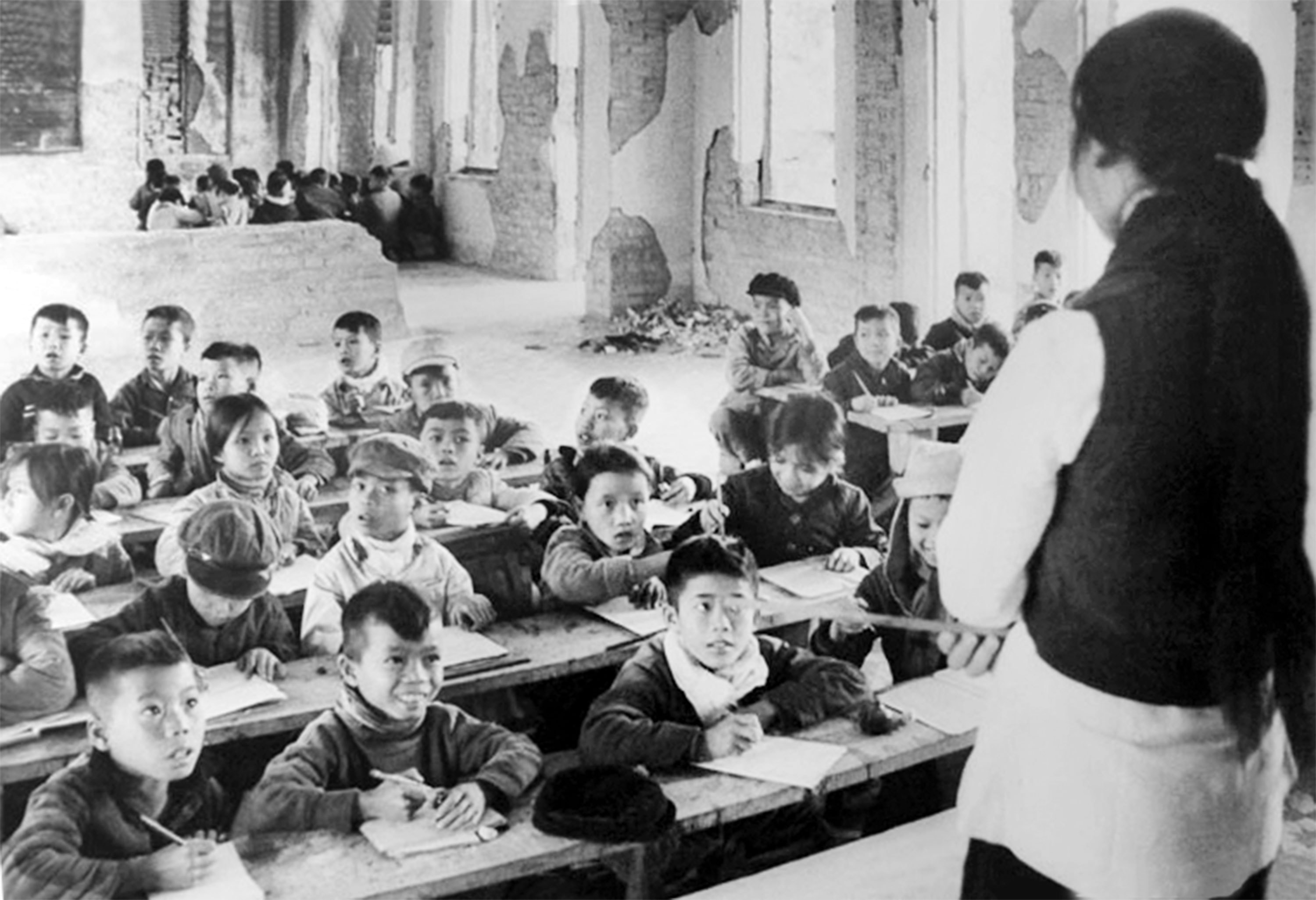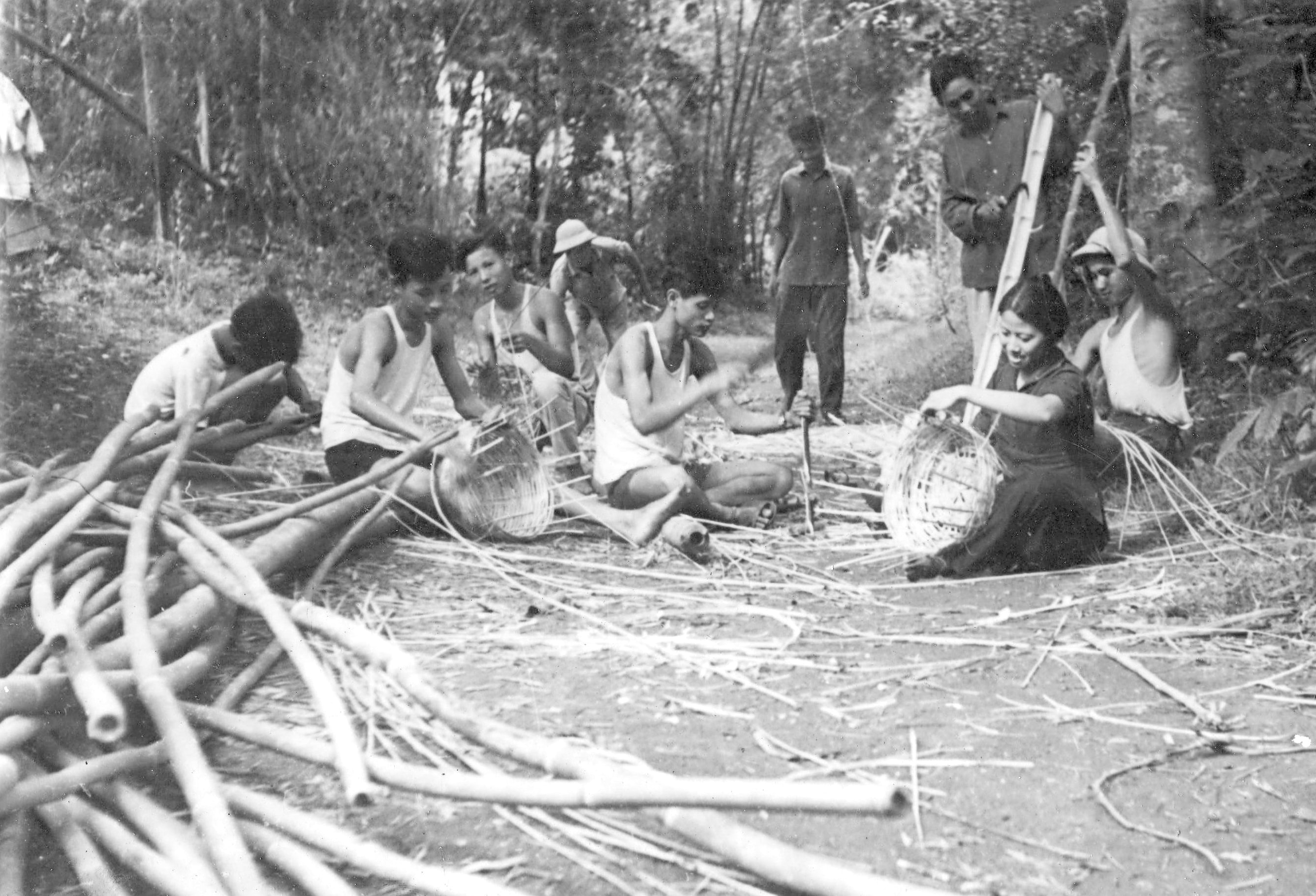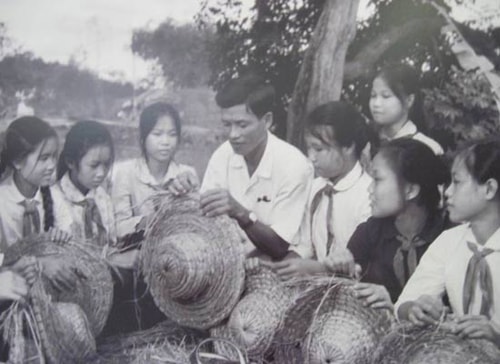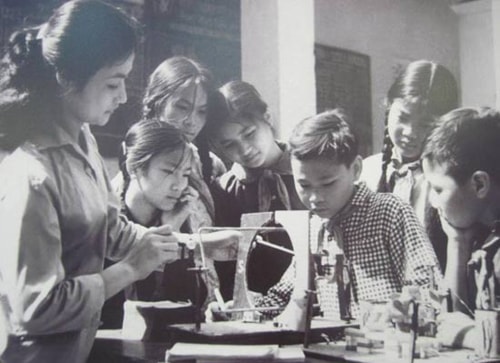Remembering teachers of Nghe An
(Baonghean.vn) - I am a person who often lives by memories. Memories are sometimes melancholy and distant, sometimes vibrant and fresh as if it were just yesterday. There was a time when I went to school, there were Tet holidays that I will never forget, sometimes they stir up again. In that old chaos and peace, my heart is still haunted, missing the teachers who taught me to be a native of Nghe An, a very far away land.
Nghe An is now very close to my hometown Ninh Binh. So close that it takes a few hours to drive from Ninh Binh to Thanh Hoa. So close that the road from my house to Quynh Luu, the hometown of Mr. Bich, my former homeroom teacher of the Math class, is just as long as the road from my house to Hanoi. However, when I was in high school more than 40 years ago, just mentioning Nghe An seemed like a thousand miles away. The names of Vinh city, Nam Dan district, Uncle Ho's hometown, Quynh Luu, Dien Chau... were all so far away, let alone the districts of Tuong Duong, Ky Son, Que Phong in the far west of Nghe An.
The first people I met from Nghe An were students from Vinh Pedagogical University who came to the school for an internship. It has been almost half a century. At that time, we, the eighth grade students, carried the first loads of soil to pour the foundation of the classroom on the Tien Nong - Yen Mac land. The newly established school lacked everything. A wild grass field. An ancient green oak tree. The classroom was made of bamboo and thatch. Each student contributed 30 pieces of thatch to cover the roof; the wood for the pillars, rafters and bamboo was apparently provided by the district. We dug the soil to widen the foundation and also created a pond; this pond grew bigger and bigger, as students from the following classes continued to dig and expand the foundation. The students all came from farming families - fathers plowed, mothers planted rice, older brothers fished, sisters went crab fishing; they were said to be the children of strong farmers, but all of them were: Skinny. Weak. Skinny. Their faces were as green as Malabar spinach leaves. The whole village was hungry. The whole commune was hungry. At that time, the whole North was also hungry. While carrying dirt to level the classroom floor, one child was so hungry that his face turned pale and he fainted, the dirt falling all over his legs and stomach.
 |
| A classroom during wartime. Illustration: Document |
One Monday morning, I was late for school. I was late because it was after Tet, the weather was a bit chilly, and along the way I was busy looking at the sky and the earth, the mountains and rivers. My mind was filled with the feeling of seeing the peach blossoms in my garden that had just bloomed, opening their pale pink petals. I saw someone's Tet pole that hadn't been lowered yet, still swaying its talismanic leaves in the wind, the terracotta bell hanging on the top still making a clinking sound. The district market was deserted and desolate, the stalls, chairs and tables bare. Just before Tet, at the market gate, under the red-leafed banyan tree, people were selling Dong Ho paintings printed on die-cut paper; then the man selling clay figurines dozed off, the woman selling ice cream occasionally honked her horn... In the market, there were rows of sticky rice, green beans, wood ear mushrooms, shiitake mushrooms, and even dong leaves and giang tubes for people to wrap banh chung... Yet, after Tet, it was cold, the people of my hometown had gone to the fields to work, the market had not yet arrived, it was so lonely. In my heart as a schoolboy, I kept missing and regretting the Tet that had just passed.
Startled, knowing I was late for the flag salute, I ran to class, but the school yard was already packed with students sitting in neat rows. I hurriedly sat in the back row. Calming down, I looked up and saw that on the right of the flagpole were rows of chairs where familiar teachers from my school were sitting, and on the left were more than thirty young, unfamiliar men and women. And a strange, tall, lanky man was singing, singing with a Nghe accent:“Someone’s voice is calling out in our homeland, pick it up and wait/ It’s the voice of the militia practicing to protect the village/ Protect the sky of the Soviet Nghe An/ Oh, the Lam River flows from the mountains/ Through Anh Son, Thanh Chuong, Nam Dan/ I can still hear, I can still hear the old voices echoing/ Oh, when will the Lam River dry up/ Just like the revolutionary spirit of our people/ Even though storms and rains come/ Soviet Nghe An is still Nghe An...”.He sang in a high-pitched voice. Very passionately. We, the young students sitting below, opened our mouths wide to listen. Later, I learned that it was the song “Tieng ho tren dat Nghe An” by musician Tan Huyen.
 |
| Students of Vinh University of Education make their own tools to join the production with the people. Photo: DHV |
The young man who sang with a Nghe accent was one of more than 30 male and female students from Vinh Pedagogical University who came to my Yen Mo High School for an internship. After the flag-raising ceremony that day, we also called the interns... teachers. The young, enthusiastic teachers were like a breath of fresh air blowing into the simple, poor, and humble district school. The teachers replaced the old teachers to practice being homeroom teachers, then attended the lectures. At first, we sat in the classroom, sitting in rows of chairs listening to the old teachers lecture; then the new teachers practiced teaching. We students went to school more diligently, came to class more on time, because the classroom atmosphere was lively, bustling, and fresh.
My homeroom teacher is a female student of the Faculty of Literature. Her face is fresh and charming. Her pearly white teeth and expressive eyes make her friendly and approachable like an older sister. During recess, the teachers often organize supplementary entertainment activities. During a 15-minute break between two lessons of Tran Hung Dao's "Hich Tuong Si", she said: Just now, you have heard me talk a lot about war, enemies,... Now, Tet has just passed, Spring has come, which of you remembers any poem about Spring, or Tet, please read it to me and my classmates to change the atmosphere? A few arms hesitantly raised up and then lowered. Perhaps no one knew any poem, or knew it but were shy, which is the nature of shy country students, so they did not dare to read. She "wound up the spirit" that the students must be bold, that they must be confident so that when they go out into the world they can take control of their lives, then she said, she read to them the poem Tet Market by poet Doan Van Cu:“...People from the hamlets were bustling to go to the Tet market/ They happily pulled their wares on the green grass/ Boys in red shirts ran around/ A few old people leaned on their canes and walked slowly/ A girl in a red blouse covered her lips and smiled quietly/ A baby boy nestled his head next to his mother's blouse/ Two villagers carried a pig and ran ahead/ A funny yellow cow chased after them...”.The Nghe accent resonates. Sometimes high, sometimes low. Very expressive. I was good at Literature, knew many stories and poems, and often recited poems in class during art class. But the Tet Market, when I read it, it was smooth, without any emotion; but she read it so touchingly, passionately, and wistfully. As she read, the images of the boy running around, the girl in a red blouse, the old lady by the ancient temple, the time to wash her hair, the old scholar, then the yellow cow, the dark-crested chicken, the edge of the thatched hill, the old buffalo pretending to sleep... kept appearing warm, strangely familiar...
After a month of internship, the group of students from Vinh Pedagogical University left. It was like a flock of chirping birds coming and going. We walked to But market to see them off so that the car could take the teachers to Ganh station to catch the train back to Vinh. The class that day was sad. Everyone was quiet, their hearts were filled with longing, remembering something that had just passed so quickly that they could not grasp it.
At the beginning of the peaceful 9th grade school year, the US declared the expansion of the war to the North. We wore straw hats and went to school for a long time. There were thousands of worries, worries about not eating the cooperative rice, worries about drawing water to scoop up extra crabs and fish to make up for the rice mixed with potatoes and cassava at mealtimes, worries about studying so that teachers would not scold us; but the most terrifying obsession was when we crossed But Bridge, afraid of American bombs. In the half-submerged, half-surfaced shelter, the light was dim, but we were still engrossed in studying. At that time, many teachers were still very young and had not yet started a family, living in a row of apartment buildings, each room next to the other, in front of each teacher's room they planted a patch of water spinach, a few clusters of coriander, dill, basil...; they cooked for themselves. Many students were over twenty years old, big and strong, and occasionally stopped by the teachers' rooms to help cook. I still remember Mr. Bich, my math teacher and homeroom teacher, from Quynh Luu (Nghe An). His face was a bit pockmarked but very charming and manly. He wrote in a strong, liberal fanteri style. He was gentle and close to his students; the female students loved him very much.
 |
| In addition to teaching reading and writing, the teacher also taught students to weave straw hats. Illustration: Document |
Ms. Y, who taught Chemistry, was from Nghe An. She was petite and pretty, with skin as white as a peeled egg. She smiled a lot and was gentle. Mr. Chau, who taught Chinese, was also from Nghe An. He was tall and had a square face. After Mr. Chau had been at the school for a while, he and Ms. Y fell in love without even realizing it. I still remember clearly that at the end of the morning Chemistry class, she hesitated and said, “I will get married in three days. My husband is also your teacher. I invite you to my wedding day, and you will know who my husband is.” She smiled shyly. Her face was red. My whole class was like a swarm of bees. “Mr. Chau!”; “We know”; “Mr. Chau”; “Ms. Y - Mr. Chau”; “Mr. Chau - Ms. Y.” She shoved the invitations into the class monitor’s hands and told him to pass them on to the students, then smiled and hurried out.
And Mr. Thuc, also from Nghe An, taught Physics. He had a bright smile and white skin. Mr. Thuc was also the teacher of my fourth and fifth sisters. He married teacher Hai when she taught me in middle school. On the day of their wedding, my sister took me to the wedding by bike. The wedding was in the hall at night. In my young mind were strange images: The main background had a double happiness character cut out and the two letters T and H intertwined and entwined. On the right was the slogan "Happy new relationship, compete to teach well, study well". On the left was the sentence: "Sweet happiness, for dear students". On the tables were bowls of roses picked from the school garden mixed with wildflowers. A plate of candy and a pack of Tam Dao cigarettes. Green tea poured from a teapot. The bride wore a white shirt and black silk pants. The groom wore trousers, a white shirt and a tie. A simple, ordinary, yet warm and happy wedding for teachers of a district school.
War. Warfare. The endless bombs and bullets finally stopped. January 27, 1973, the Paris Agreement on ending the war and restoring peace in Vietnam. The North was silent with the sound of bombs falling, and we teachers and students returned to our old school to finish the unfinished second semester... The North was silent with guns, but the war in the South was still fierce. At the end of 1973 and the beginning of 1974, our class 10B continued to have many empty seats. Mr. Van - the Principal organized many farewell parties for students leaving for the army. We said goodbye to our friends who had gone to war without thinking about the day they would return; we kept encouraging each other to return to school to finish the unfinished lessons when the country was unified.
 |
| A practical lesson with simple tools. Illustration: Document |
We often stood around the oak tree or rode our bicycles and felt sad when the day of farewell marked the end of our high school lives. I diligently held a pocket knife and carved into the trunk of the oak tree: Farewell to school days, May 31st... The tree oozed sap as if crying. In a moment of sadness, the homeroom teacher Bich passed by and suddenly saw me; he patted my shoulder and said: "I share your sadness of leaving school. But think, if everyone carved hundreds, thousands of numbers and letters into the trunk of the oak tree like you, the oak tree would be in a lot of pain." I felt guilty, guilty on the last day of leaving school. Now, my carving is no longer there, the tree's gnarled trunk is sweating a lot.
After many years away from home, worrying about making a living, we finally returned to our old school. The school was here, but where were the old teachers and friends? After searching and connecting, we finally invited the teachers who had taught us in the past. Mr. Bich taught Math, Ms. Y taught Chemistry, Mr. Chau taught Chinese from far away Nghe An, all returned to our old school. Time passed quickly like a shadow passing through a window. Just yesterday, the students' hair was still green, the teachers' hair was also green, but now it had turned gray, already gray. Mr. Bich still recognized me. He still remembered the day I enlisted in the army in January, when he came to my house to say goodbye. He returned home for Tet and received news that I had joined the army. He took the train from Cau Giat Station to Ganh Station, my hometown, then cycled against the winter wind to school early just to be in time to meet his students on the day of enlistment, as if if we didn't meet, we would be apart forever. He put into my hand a withered banh chung leaf wrapped before Tet, but still fragrant and soft. Tears welled up in my eyes because of the kindness of my teacher from Nghe An. He said: “You go nine times and come back ten times, then come back to school to recite poems for me and my friends to listen to.” Now that we meet again, he is happy because we have all grown up.
Ms. Y still had a bright smile like she did decades ago. The teachers retired and lived in Vinh. She often listened to the late-night stories and evening entertainment programs on the Voice of Vietnam. She said: I called Mr. Van and asked if there was a student named Suong Nguyet Minh who wrote about the school, teachers, and old friends in our school. Listening to the radio, it felt like it was right before my eyes. She said: Every time I heard your articles about my hometown and old school on the radio, I was moved to tears. I remember Tet coming, before I could go home to celebrate New Year's Eve, the teachers and teachers made an early New Year's Eve meal. I went to But market to buy Tet, I bought freshly ground sticky rice flour and molasses to make sticky rice cakes. The sticky rice cakes from Nghe An, my hometown, were similar to the molasses cakes from my hometown. I promised to make sticky rice cakes for you to eat when I come to Vinh.
Truly, I cannot explain why teachers from far away Nghe An spend their whole teaching life in my hometown Ninh Binh, and only return to their hometown after retirement to live out the rest of their lives? Oh my beloved teachers from Nghe An!

